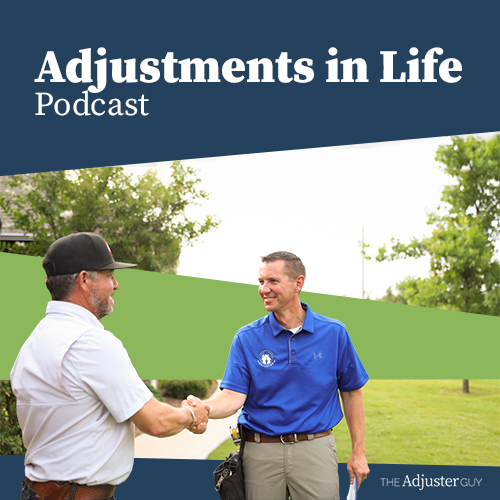Transcript
Alan: Alright folks, welcome back to Adjustments in Life. Well guys, you have if you’re a subscriber to the TAG private community, you have probably seen his name maybe even a picture of him while he’s been out and about. You’ve probably heard his voice on this program a few times, so today we have Jason Dyson back with us.
We’re gonna get a little bit of story on Jason.
Hey, how are you doing today?
Jason: I’m doing great, Alan. Thanks for having me.
Alan: Always a pleasure. I love to have you on the show! I want to give the listeners some history on you the people listening to the program are new adjusters are looking to us. I want to give them some history on us, so they know where we’re coming from and the experiences we’ve had that were sharing with them.
How’d you get started in all this?
Jason: Oh man it was a long ride. I came out out of college with a bachelors in criminal justice and during my time in college there I worked doing construction—got my knowledge of that doing everything from welding to setting forms to building frames to all of it.
So kind of had that construction background a little bit. After getting my degree in criminal justice I realized that policing wasn’t something that wanted to pursue. Coming out of school, got a private investigators license and got into doing SIU for insurance companies—mainly was Worker’s Comp. had a surveillance van did the whole undercover surveillance thing for Worker’s Comp. claims.
Got into doing some skip tracing and locating and all that kind of stuff; got into recovery work and repossessions. And one day I was sitting in an office trying to do repossession work and collections and just really was not enjoying that trying to squeeze money out of people and got a phone call—I guess I had my resume on one of those sites at that time I think it was monster jobs—and got a phone call from a recruiter with an insurance company saying “I saw your resume, and we think you would might be interested in being an adjuster.”
I had no idea what an adjuster was, but I knew that I didn’t like what I was doing and I said “yeah, I think I’d really like that. I think I’d be great.” And they said, “perfect come down and interview—I think it was a week later—we will be holding interviews so I will sign you up” and then gave me an address and said “come on down.”
So I had to go look up what actually an adjuster was. I figured that out and “OK yeah I think I could probably do that.” Went down thinking “I got a new career they called me I’m gonna be an adjuster.”
When I showed up for this interview, they were hiring for seven positions; and I think they were 260 people there to interview for seven positions. And I interviewed and got it.
This large insurance company—their business model was that we were all in training for six months before we ever saw a claim—everything from policy to scoping to how to read a measuring tape is so on and so forth.
They sent us to all the schools. I’ve been to Vail National I’ve been to Cause and Origin school than a bunch of different training schools and work my way through that. Then the agreement that we had was at end of the six months you have to be willing to relocate anywhere in the nation that they needed you.
That training was held in Houston, Texas.
Alan: Which is where you’re from correct?
Jason: Yeah, I was born and raise there; so in kinda worked out good. I was able to stay at my family‘s house, and in the mean time, i my wife graduated from college so she moved down there. We were all staying at my parents families because it wasn’t really worth getting an apartment or anything because we knew we’re gonna be going somewhere.
So she just got a temp job, and they came to me at the end of the six months and said write down 10 major cities in the United States that you wouldn’t mind relocating to. Man that’s a hard job when you’re 20 something years old. You haven’t traveled the nation, and I needed my list. I got my first choice which was Austin, Texas; so got sent to Austin.
We up and relocated, rented a house at my local territory there as an adjuster, worked my way up from field adjuster to what they referred to as technical specialist to which is kind of more policy and intense coverage issue claims up to basically large loss kind of adjuster right under GA or general adjuster.
I worked 2004 the hurricanes down in Florida as a staff adjuster and was part of the unit called a resolution unit and all we did was fix bad claims, and they were all represented attorney PA etc.
But I had a bunch of buddies that were independents at the time, and I’d actually go down and stay at their house—they had a house rented at Port St. Lucie. I’d go down there and run my stuff—again back in the day of the paper file you know so at 7 o’clock I would shut my laptop on for my staff work and open a different laptop and I wrote estimates for those guys.
I made more money that year writing estimates than I did my salary. The next year, 2005, for those you’ve been in the business that’s always a benchmark number that was Hurricane Katrina. Katrina hit, buddy of mine—one of the guys I was writing estimates for—called me right after it hit and almost jokingly—because he knew I wasn’t going anywhere back in 04 we talked about it—he said “well you ready becoming independent?”
And man those stars were just aligned. I just come off a writing a big fire and I have nothing in my queue and was a little frustrated—is a word I’ll use—with the company I was working for and I was pretty well capped off at where I was move in with them. And I said you know what yeah and that was on a Thursday.
He said we’ll sleep on it I’m gonna have somebody call you. Friday morning at 6 o’clock in the morning my phone rang says owner of a small IA firm. He says “you come highly recommended. You know what you’re doing?” I said “yeah.” He said “I want you to go to Minnesota to work hail for an insurance company.” I said “hang on. there’s a hurricane in my backyard. I’m coming off a staff job. I don’t own a ladder. I don’t own a tape measure. I don’t own a computer. I’ve got all these expenses that I’m fixing to float, and you want me to drive across the country to go work at hailstorm?”
And he’s like “well we’re trying to pick up an account we’ve typically been a hurricane company kind of transitioning into doing some other stuff including hail. Really don’t have anybody versed in that. You’ve being from Texas have seen a lot of hail and right now nothings open. You’re not getting into New Orleans and pretty much all the outlying stuff they’d already given out to their more senior core adjusters within that firm.
I said “man I just don’t know that I can afford to do that.” He said “well can you close 100 hail claims? I said sure. And he said “well the day you close your hundredth hail claim I’ll give you a $10,000 bonus. And I said “for sure. I can close 100 hail claims—send me that in writing.”
And he did and I took out a loan bought equipment—that was Friday at 6 o’clock in the morning and at 8 o’clock in the morning I called my boss with my company, quit my job, went out that evening bought all the equipment, Sunday morning I was on an airplane, flew to Minneapolis, and did a secret was 111 hail climbs in 18 days.
Alan: that’s smoking it man.
Jason: Yeah on my very first IA deployment, but I knew I had to hit that hundred mark and I was the best man in my buddies wedding so I had him I had Go Home day that I had to make. So I smoked through it, got my bonus, paid off my loan came home, went to the wedding. My wife literally met me at the airport with my pick-up with ladders that she had bought, all new gear, everything loaded up, met me at the airport, I jumped in my truck ran to the wedding—by this point, Hurricane Rita hit—transitioned right into Rita, ran through a bunch of Rita claims, was helping a good buddy of mine close his out, my phone rings.
They say “hey”—at this point I’ve got 100 homeowners claims in the lower ninth assigned me for Katrina. We’re trying to wrap up my buddy stuff so we can get down to Katrina to go run these claims him and both have. They said “hey another storm here and we have an opportunity. Do you want to keep those claims or we’ll give you 100 commercial claims in Fort Myers Beach in Naples.”
They said “we see on your resume you’ve done commercial.” I said “yeah.” They said “how big of a sheet can you write?”
I said “a big estimate isn’t nothing but more line items.” They said “well you can keep those or go to Florida.” And I said “man I’m a Floridian and my buddy here I’m riding with he’s a great commercial adjuster too”—he’d never seen a commercial claim and he’s like ‘woah!’ And I was like “You’re good shut up.”
So we took off, went to Florida, and kinda knocked it out of the parking on my first year as an IA. I kind of set myself up and the stars aligned Katrina, Rita, and Elma. It was a trifecta. Did a great year, come home, and then things were dead.
And I actually went out and got certified. I did some auto work. I always had a side hustle to come home from and go right into doing something else. I’ve always had to be working. Got into doing that. Then in 2006 got a phone call from another IA firm at the end of ‘06.
They said “yeah you came recommended. We need some help over here.” I said “yeah and I got two buddies that are really good too.” Brought them with me, went to work with that firm, and I’ve stayed with that firm throughout the rest of my career for the most part up until the last year.
But I spent five years in management with that firm—managing everywhere from the start off as a temporary manager, team lead to field manager, regional manager, senior field manager, training manager, and the whole gamut of it.
Got back to the field last year, and that’s really where my heart is is back in field. I’m just loving it—enjoying some of my claims. We just came through snow-mageddon here in Texas which is odd to be running a bunch of claims in February and March when your cat adjuster.
Alan: Especially in Texas. It’s not uncommon to go to the northeast, but to have that massive claims in Texas in February is unbelievable.
Jason: Right you know and to be able to run a CAT level volume of claims and sleep in your own bed at night that doesn’t come about every day. So that was interesting.
But I’m going on my 19th year so or knocking on the door of 20 years in the industry.
Alan: No more CE for you, pal.
Jason: Yeah I got one more year!
Alan: OK yeah that’s right you still get to complete your ethics.
So you and I have known each other, I guess we met in ‘15 I believe. We were both working that snow storm in Boston. It was record snowfall in Boston.
Of course the industry changes incredibly from year to year sometimes month-to-month—well I mean we can week to week—things change up mid storms. Going back to some of the things you were highlighting through your career and through your training. There was an incredible amount of training that went into your career at the very beginning.
Of course the carriers do a little bit different training style than what we do as IA’s, but it’s just incredible to hear the differences in what the amount of training that went in to the adjusters in that era of adjusting versus what we’re learning now. There’s just such a big spectrum move of what went into learning how to do it and as an IA, you incurred the staff side so you got more in-depth education.
In the IA side of things it’s always been somewhat slim on the training, but what a huge difference it made in what you could achieve in your career versus what’s been given now.
Jason: Absolutely, I mean I look back at the opportunities that I was given and how I was able to you know my first year in the IA world in ‘05 with those big events—to be able to hit the ground running if you will, to be able to produce and make money. And I look back at it now I’m like “man if I would only known then what I know now.”
Then I didn’t know that I knew more than most everybody else out running around doing it. But I just didn’t know. I didn’t know everybody else didn’t have the same experiences I had at the time.
Alan: That y brings up another point: sometimes adjusters we get out there and we get going and we don’t see everybody. We don’t know what everybody else is doing we’re focused on our files and getting them close and moving onto the next storm.
So if you’re one of those adjusters, if you’re listening right now and you’re one of those adjusters of sitting there and you’re running through your claims on an every day basis and you’re not getting much flack from the managers and you’re just clicking along your closing claims life‘s good. Kudos to you. I want you to know right now you’re probably an A-list adjuster.
If you have any concerns, you’re you’re probably on that list because you often assume that there’s somebody out there that’s doing so much better than you because you’re not hearing from the managers. If you’re not hearing from the managers, you’re the one that’s doing good that nobody else to deal with.
Jason: Sure sure. And I know you’ve been on the management side as well Alan, but I can tell you from being a manager the guys that I want on my team—or girls—are the ones that I don’t ever talk to. And when I talk to them it’s “hey! Just say hi.”
Alan: That’s right.
Jason: Because they make my life easy, and if I’m not on the phone with you saying “hey I need this file turned in” or “hey you’re not adhering to these guidelines” or “hey whatever.” You’re the one I want on my next event.
Alan: For sure, for sure. Moving kind of switching gears a little bit, this job requires a lot of urgency and when I say urgency I mean the attitude of “I’ve got this many files to get to, I’ve got to get to them in this amount of time, and I’ve got to be as accurate as I can be, and I need to be able to be flexible enough that as soon as these are done I need to pack up my gear and roll out to the next location.”
Can you pinpoint some of the places you were and what you were doing and displayed the urgency in what you were doing so that you could get done with where you were at and move forward and be just as beneficial in another location in another location as you were that day in that location you were working?
Jason: Absolutely. A note for new guys coming into the field, when there’s a firm or a recruiter or dispatcher or whoever’s trying to call you—especially if you’re trying to build your name within that firm—there’s only one word that needs to be in your vocabulary and that’s “yes.”
You shouldn’t be when, you shouldn’t be where—it should just be “yes.” When they say “hey we have an event would you like—“ “yes.”
Keep yourself—I called it my CAT kit—I had my client shirts you know, I had my printer, I had all the stuff already in a box ready to go. This is before I had an RV then I just got the RV packed.
But I had my CAT kit ready to go to where when my phone rang, I literally grab my laptop through that box in my truck, and we were going down the road.
Be the guy that that says yes. Be the one that shows up on the ground ready to go gear in hand. Don’t show up saying I need a gauge or I need to get a s pitch gauge.
Now is the time to have that. If you don’t have that shingle gauge or if you only have one by a second, if you only have one pitch gauge buy a second one. Make sure your gear is ready to go, because that can hold you up.
You don’t wanna show up to the storm ,go run 10 claims, and find out oh you don’t have pitch gauge. Now you have to go back to all of those. Just roll with it. You have to be able to adjust. I mean in 2011, I was working an event in Sacramento, California, ran claims one day closing them out, was starting to get low on the inventory, got a phone call “hey I need you to close like everything you can close by in the next two days. We got another storm coming up.
OK, they’re tracking the system coming in. So I call everybody up, move everything up, run through all my claims in two days, manager calls he says take off head east.
“Alright, which way am I going?” “Just head east.”
Ten-four ,hook up the RV, I’m headed east. I get a phone call. I’m rolling down interstate 40, I get a phone call “hey have you made it to 35 yet?” “It’s coming up here in the next hundred miles.” “Well post up at the next truckstop or something near I 35 and 40.We’re going to figure out which way you’re going.”
OK stay the night at a truckstop in the RV, wake up the next morning, get a phone call, “go to Charlotte. Go to Charlotte, North Carolina.”
Do you on a map? That’s literally traversing the county. General manager is like “trust me, go to Charlotte.” So i go to Charlotte and nine months and 1000 hail claims later, I finally wrap that event up; and that was probably the most lucrative single hail event I’ve ever had.
And it’s just by just rolling with it and saying yes. It’s not where am I going well let me call my wife and find out. I mean you better have your house in order. You better have a very understanding spouse and family that know, but I’ve missed birthdays and funerals and weddings. It’s horrible, but I had a goal in mind and my wife and I had it set up and knew what our goal was and worked to get to that point.
Alan: That’s right, that’s right. You know one of the I think one of the biggest examples for me in that in the same respect would be wrapping up hurricane Sandy. I assumed I was headed home. Of course Thanksgiving had past, and we were coming up on Christmas and before I could get from New York back to Texas, they called and asked me to go to San Francisco.
So we were home for two days, washed our clothes, packed everything back up, and headed to San Francisco. Then I spent Christmas in San Francisco—course my kids—your wife traveled with, you my wife traveled with me along with my kids—but it was t being flexible and saying “okay yes I get that it is Christmas; but yes I’ll go no problem.”
And you know that just lead from one deployment to the next. So you’re right, just saying yes and being that t person that, regardless of where you’re at—especially in your starting years—the last thing you want to do is get the opportunity to deploy and say “well I have something I need to do Saturday so no I can’t go on this one.”
Jason: And what you’re going to find is with those dispatch people are making those phone calls they have X number of slots are needing to fill. And if you say “well I’ll call you back.” They’re not gonna stop making phone calls waiting on you to call back. They’re going to call the next on the list and when you call back they may say “ well we filled that one we’ll think of you on the next one.”
My wife came with me in 2011, so I spent a lot of years on the road without Megan; and you mentioned Sandy—when hurricane Sandy hit, I was working hail in Minnesota. And I had already been on the road for months and months and months at this point, and I held onto that until gosh right after Thanksgiving. And it was like finally I was like “OK I’ll go to the East Coast” and went and dropped my RV because I knew I didn’t wanna try to winter in my RV. Dropped my RV in Indiana at one of my buddies place, and drove out there with another buddy of mine and worked Connecticut, wrapped that up.
I was heading home just before Christmas, starting to head back to Indianapolis area to get my RV and the phone rings. And it’s a manager with the firm saying “how far did you get out of Connecticut?”
I look down the speedometer. I said “about 156 miles.” He said “turn around go to Jersey.” So we turned around, went to Jersey, and ended up being in Jersey until February I think. I working the Jersey shore for that same event.
And it’s just being able to roll with the punches. And in ‘09 I left home, I think I was originally heading, I don’t even know it doesn’t matter—rolled out of the storm and I didn’t go home until halfway through 2011 and the only one reason why I even went home then was because we packed everything up had an estate sale, sold our house, sold everything we owned ,and bought a new fifth wheel.
Hit the road full-time with no house and that our first event together like that was McAllen, South Texas hail storm. Good hailstorm. Wrapped that up, and they said “go to Mitchell, South Dakota.”
If you’ve ever drove from McAllen, Texas, to Mitchell, South Dakota, pulling a 40-foot fifth wheel with two dogs in the back of the truck—it was an event.
Alan: That’s a hall. That’s a good hall—especially in a short amount of time.
Jason: And it’s never “yeah, I’ll try to get there as quick as you can.”
Alan: Yeah, it’s we needed you yesterday.
Jason: Exactly, yeah we’re putting claims in your inbox and we need you to start inspecting tomorrow. Make your calls while you’re driving.
Alan: Exactly, there’s two stages to this question OK so favorite place to work that you had during your career and favorite place that you just love to be working in your career. Because we have those that we like to work ,because the money is outstanding when we go there to work; but it may not be the place that you really like to be.
So what place that you’ve worked would be your go to place to be able to work that you would enjoy just being there the most. Do you know?
Jason: The one I enjoyed being there the most probably either North Carolina—Carolinas are beautiful North and South Carolina really beautiful—enjoyed Wisconsin for like three or four months a year and then with the white starts falling it’s time to get out of there.
So many people say Florida because the money, hurricanes, and stuff like that. I’ve done OK there but the biggest opportunity storms I’ve went to was when I was managing, so yeah Florida has never been a huge moneymaker for me just because of the timing of everything. I watched a lot of guys make a whole lotta money for many years.
But I really enjoyed the Carolinas, Wisconsin, there’s a bunch of places; but nothings home like Texas.
Alan: Well that’s true. I’d have to say for me that I can I think I can honestly is—and again I’ve been to Florida, I’ve worked all that I worked on the 2017 hurricanes which were extremely lucrative if you were field adjuster.
I still think that I can combine both of those into one, and I can put Rapid City, South Dakota, in that place; because I’ve done extremely well financially working Rapid City, South Dakota, for a good event. They get multiple events but when we get a good storm that rolls through there.
Jason: Didn’t I do a ride-along with you out there sometime last year?
Alan: I think you were going to. I’m not sure we ever connected for the ride along, but just being there is this you know that area—the Black Hills area—is absolutely gorgeous. I’ve never been there prior to that particular storm, and we would go back at any point in time.
I’d always been—my first pick was always—would’ve always been Colorado. Just because I can get up at the hotel and look at the mountains and smell the fresh air. And I’ve had some pretty good runs in Denver; but Black Hills—Rapid City, South Dakota, tops at all for me.
That’s probably one of my most favorite locations out there that I have been and worked in.
Jason: Yeah, yeah. I I’ve worked out there in a managerial capacity as well as an adjuster capacity. Worked Mitchell, which is east of there about 15 -16 miles—and then also working Black Hills—Rapid City at the same time and traveling in between. There’s not a whole lot between Rapid City and Mitchell they’re pretty much plain.
I remember literally driving through there trying to run claims one day and one city and drive over to the next one to run claims the next day and on the phone with the manager and about golf ball size hail started beating on my truck. Manager’s like “I can barely hear you. What’s going on?”
And I was like “it’s tearing my truck up!”
Alan: We travel around and we get that. It’s a great opportunity that we get to be able to see the different places. I’m not a big fan of flying, because I like to see the country. I like to know where I’m going.
I think that’s a benefit that I have over a lot of people is being able to see what that area looks like—we’re not just flying over looking down out of a plane window. Been some good places really enjoyed it.
So if you could wrap up one thing—one solid piece of advice for the folks that are coming into the trade and those that may be in it for a couple years even and still trying to find their way—trying to get their foothold in the door and get rolling in this. If you could give them one solid piece of advice that you think would be the key to success what would that be?
Jason: The one piece of advice I would have to say—and I’ve told many of adjusters this and I was told it as well—nobody’s ever been paid for inspecting a claim. You don’t get paid until the bows on the package, and you hit the connect button.
So why go out and inspect a whole bunch of claims and then sit there and try to write them from memory or photos or what you did a week ago. Make yourself a conveyor belt—inspect it, write it, turn it in. Inspect it, write it, turn it in.
That’s how you keep your steady flow of claims, money, more claims—which equals more money. So just make your process, don’t dump truck. Nobody gets paid for inspecting claims.
Alan: That’s great advice, great advice. I can’t back you up—if I can back you up 150%. I would do it. I mean i guys that is the most important thing. You’ve got to get these claims closed, and you got to get them closed accurately.
So yes that’s number one number. Again just like Jason said, you cannot get paid for a claim that isn’t closed. If you’re inspecting, you’ve got to get them wrapped up and you got to get them closed accurately.
Alright man, well we got to get out of here; but man thanks again for being here! So we’ll keep rolling down the road and we’ll see all of you in about two weeks.
Jason: Thanks, Alan.
Alan: You bet!





